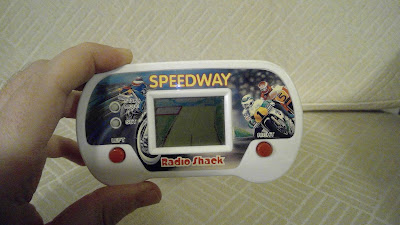I'm just coming out of a rough week with franchise movies without anything new in mind that won't be a followup to my movie reviews. For the moment, I'm doing something different (except for the last time I did it), which happens to be what every blogger and Y*utuber has been doing forever: Looking at "retro" video games. But I'll be dealing not with Atari or NES, but with what are now commonly held to be the worst of the worst, handheld LCD games (and possibly some even more archaic and eccentric tech), starting with a lineup of entries from the most famous or notorious manufacturers. So were they "that" bad? Well, let's see, starting with the first item in our lineup.
Right off the bat, a major "myth" to correct is that Tiger Electronics wasn't the only player on the field, nor was it immediately clear that they were or would be the leading producer people remember them as. From my own recollections, many if most of the specimens I ever had at home were from Radio Shack, actually supplied by their parent company Tandy. Even for the 1980s, these were cheap and generic-looking. However, they were possibly the best in terms of reliable functionality: The controls were responsive and intuitive, the graphics were comprehensible, and it was usually easy to figure out what to do. This one is typical of their "'keep it simple" approach. You control a cyclist at the bottom of the screen, moving left and right Space Invaders style. Other bikers come down from the top, with a relatively sophisticated 3D perspective that was surprisingly common in these games. It wasn't a favorite, but I played it long and often enough to max out the high score, typically the only way to "beat" these games. The one flaw of the game is that it doesn't have an on/ off switch, so it simply ran until its one tiny battery ran out. I could change the battery with a screwdriver, but never cared enough to do it. Moving on, here's a game really from Tiger, and by consensus the good one.
Tiger has of course been ground zero for controversy and criticism, drawing the wrath of none less than the Angry Video Game Nerd. Having seen the onslaught of venting, my feelings have been mixed. Make no mistake, the critics aren't wrong, but they aren't giving the whole picture. The chief causes of Tiger's infamy are, first, that the company kept making LCD games long after they were "supposed" to be obsolete, and second, that they went completely overboard on licensing. What really happened was that the company went from making a relatively modest catalog of functional and sometimes entertaining games to a vast catalog of hastily churned-out titles that would have been as interchangeable as paper dolls if not for their idiosyncratic flaws in design and play controls. What's hard to assess is just how early this slide started and how long it took. They got on the tie-in gravy train very early, notably with a series of King Kong games in the early to middling 1980s (see Electronic Plastic and Handheld Museum for two comparatively intriguing examples). On the other hand, it didn't go into overdrive until as late as the 1990s, when they jumped on properties like Batman and Jurassic Park. To my best recollection, I got this one at the same time as the Jurassic Park game, and the difference is night and day.
What should have been a warning sign for that pair is that the Pinball game is dated 1987, at least six years before JP. It was a simple, attractively designed game that must have sold well enough to stay in production for many years. The long-lost Jurassic Park game was by comparison quite possibly the worst LCD game I ever played, with a clunky layout (prominently featuring the pseudo-3D gimmick), overcomplicated graphics and gameplay, and stiff controls that were literally painful to work with. In further hindsight, the Pinball game had more than enough of its own problems, including unrealistic and oddly predictable ball mechanics. But compared to the 1990s onslaught of junk, it was a gem to be thankful for. Here's some pics I tried to take of the game in action.








No comments:
Post a Comment